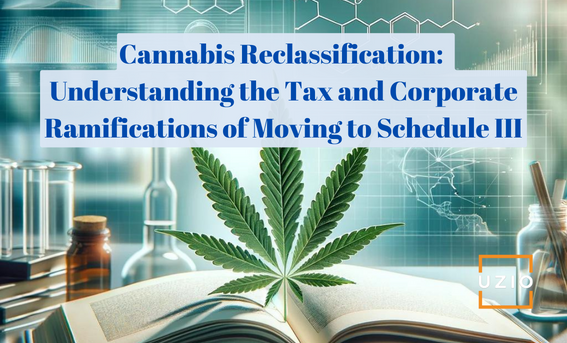
Rescheduling! Cannabis moving from schedule I to schedule III and what that means for taxes, companies and HR
Quick links
-
Introduction
-
Tax Implications for Cannabis Companies
-
Impact on Cannabis Business Operations
-
Human Resources Considerations in Cannabis Companies
-
Regulatory Changes and Compliance
-
Research and Development in Cannabis
-
Public and Economic Health Perspectives
-
Looking Ahead: The Future of Cannabis Legislation
-
Conclusion
1. Introduction
What is Rescheduling?
Rescheduling refers to the reclassification of a substance under the Controlled Substances Act (CSA) in the United States. The CSA categorizes drugs into five distinct schedules based on their potential for abuse, medical use, and the likelihood of causing dependence when abused. The Drug Enforcement Administration (DEA) and the Food and Drug Administration (FDA) are the primary federal agencies responsible for regulating and classifying controlled substances.
Differences Between Schedule I, II, and III Drugs:
- Schedule I: These substances are considered to have a high potential for abuse, no currently accepted medical use in treatment in the United States, and a lack of accepted safety for use under medical supervision. Examples include heroin, LSD, and, until recently, cannabis.
- Schedule II: Drugs in this category have a high potential for abuse which may lead to severe psychological or physical dependence but are recognized as having medical uses with restrictions. Examples include morphine, cocaine, and methamphetamine.
- Schedule III: Substances in this schedule have a potential for abuse less than those in Schedules I and II, and have a currently accepted medical use in treatment in the U.S. They are associated with moderate or low physical dependence or high psychological dependence. Examples include anabolic steroids, testosterone, and ketamine.
Specific Changes in Classification for Cannabis:
The recent decision by the DEA to reclassify cannabis as a Schedule III drug marks a significant shift. Previously classified as a Schedule I drug, cannabis was deemed to have no accepted medical use and a high potential for abuse. The reclassification to Schedule III acknowledges that cannabis has accepted medical uses and a lower potential for abuse compared to Schedule I and II substances.
Immediate Effects of These Changes:
The immediate effects of this rescheduling are profound:
- Regulatory Impact: Cannabis will now be subject to less stringent regulatory controls, reducing barriers to research and broadening access for medical purposes.
- Research Opportunities: Researchers will have an easier time obtaining cannabis for studies, which could lead to more comprehensive knowledge of its therapeutic benefits and risks.
- Economic and Business Impact: Cannabis businesses will benefit from a more favorable tax treatment and increased opportunities for capital investment. Specifically, they will no longer be subjected to the stringent restrictions of IRS Code Section 280E, which disallows business deductions related to Schedule I or II substances.
This change, therefore, sets the stage for expanded medical use, research, and potential growth within the cannabis industry, reflecting a significant evolution in the federal government’s approach to cannabis regulation.
2. Tax Implications for Cannabis Companies
Introduction to Tax Changes:
The rescheduling of cannabis from a Schedule I to a Schedule III controlled substance under the Controlled Substances Act dramatically alters the financial landscape for cannabis-related businesses. One of the most significant changes is the adjustment in tax obligations, particularly concerning the Internal Revenue Service (IRS) Code Section 280E.
Understanding IRS Code Section 280E:
IRS Code Section 280E prohibits businesses dealing with Schedule I or II controlled substances from deducting typical business expenses from their gross income. This tax code was initially implemented to penalize illicit drug traffickers but has also affected legal cannabis businesses operating in states where cannabis is legal. Under Schedule I, cannabis companies were unable to deduct expenses such as rent, utilities, and payroll, placing them at a significant disadvantage compared to other businesses.
Impact of Rescheduling on 280E:
With cannabis now classified as a Schedule III substance, businesses can bypass the restrictions imposed by Section 280E. This change allows them to deduct a wide range of business expenses, which was previously disallowed. This shift not only aids in normalizing the business operations of cannabis companies but also significantly enhances their profitability.
Broader Financial Benefits:
- Increased Profit Margins: The ability to deduct common business expenses will directly improve the profit margins of cannabis companies. Reduced tax liabilities mean more resources can be allocated to expansion, research, marketing, and other critical business functions.
- Attractiveness to Investors: Cannabis businesses will likely become more attractive to investors. The removal of the 280E burden can lead to better financial health and stability, making these companies safer and more lucrative investment opportunities.
- Cash Flow Improvements: With the increased ability to deduct expenses, cannabis businesses will experience improved cash flow. This enhancement in financial liquidity is crucial for supporting day-to-day operations and facilitating growth and expansion.
Remaining Challenges and Considerations:
While the rescheduling marks a substantial improvement, it does not solve all financial challenges facing the cannabis industry. Issues such as banking restrictions, due to the ongoing federal illegality of recreational cannabis, continue to pose significant operational and financial hurdles. Moreover, states may have their tax stipulations that could impact businesses differently.
3. Impact on Cannabis Business Operations
Navigating New Opportunities:
The rescheduling of cannabis to a Schedule III substance opens several new avenues for business development and operational expansion in the cannabis industry. Companies can now explore markets and opportunities that were previously constrained under stricter Schedule I regulations.
Expansion of Business Operations:
- Market Expansion: Cannabis companies can look to expand their operations into new states and regions without the heavy burden of Schedule I restrictions, potentially increasing their market share and customer base.
- Product Diversification: With easier access to research and less stringent regulations, companies can diversify their product lines, including the development of new medicinal and therapeutic products that could appeal to a broader consumer base.
Challenges of Regulatory Compliance:
Despite the easing of federal restrictions, cannabis businesses must still navigate a complex patchwork of state regulations. Compliance with these varying regulations remains crucial:
- State Regulations: Each state has its own set of rules governing the cultivation, distribution, and sale of cannabis. Businesses must be diligent in understanding and complying with these regulations to avoid legal pitfalls.
- FDA Oversight: As a Schedule III drug, cannabis will likely come under increased scrutiny from the FDA, particularly in terms of product safety, marketing, and claims about health benefits.
Improvements in Supply Chain Management:
The reclassification may streamline supply chain processes for cannabis businesses:
- Easier Transportation: Transporting cannabis products across state lines may become less complicated under Schedule III, though this will depend on the evolving federal stance on interstate commerce for cannabis.
- Quality Control: Enhanced federal oversight could lead to improved standards and consistency in product quality, benefiting consumers and businesses alike.
Banking and Financial Services:
Although the rescheduling is a positive step, significant challenges remain in banking and financial services due to the continuing federal restrictions on recreational cannabis:
- Banking Access: While the rescheduling could lead to increased banking access, many financial institutions may remain hesitant to serve cannabis businesses fully until further federal clarifications are made.
- Insurance and Loans: Greater access to financial products such as business loans and insurance may become more accessible, helping to stabilize and grow the cannabis industry.
Strategic Partnerships and Mergers:
With reduced federal restrictions, cannabis companies might find it easier to form partnerships with companies in adjacent industries or even with international firms:
- Mergers and Acquisitions: The industry may see an increase in mergers and acquisitions as businesses consolidate to leverage collective strengths and capitalize on new opportunities presented by a larger, more open market.
- Partnerships: Collaborations with research institutions and biotech firms could accelerate, driving innovation and development of new cannabis-based pharmaceuticals.
4. Human Resources Considerations in Cannabis Companies
Adapting HR Policies:
With cannabis moving from Schedule I to Schedule III, human resource departments within cannabis-related companies need to adapt to the evolving legal landscape. This shift impacts various aspects of human resources, from recruitment strategies to employee management.
Drug Testing and Employment Law:
- Revised Drug Policies: Companies must revisit their drug testing policies. While cannabis is still a controlled substance, its medical legitimacy as a Schedule III drug may require adjustments to testing protocols, particularly for positions that do not involve safety-sensitive roles.
- Employment Law Compliance: HR departments need to ensure compliance with both federal and state employment laws, which may have differing guidelines regarding cannabis use by employees, especially in states where medical and recreational use is legal.
Employee Rights and Workplace Safety:
- Balancing Safety and Rights: Employers need to balance workplace safety with employee rights. This includes determining when cannabis use may affect job performance and safety, and how to address it legally and ethically.
- Education and Training: Educating employees about the changes in cannabis policy and how it affects their rights and responsibilities is crucial. Training programs should also cover the implications of these changes for workplace safety and conduct.
Benefits and Insurance:
- Health Benefits: With cannabis recognized for medical use, companies might consider including medical cannabis in their health benefit plans, where legal.
- Workers’ Compensation: The reclassification might affect how workers’ compensation claims are handled, particularly in cases where cannabis use is implicated in a workplace incident.
Recruitment and Talent Acquisition:
- Attracting Talent: The industry’s growth and the destigmatization of cannabis can help attract a broader talent pool. Companies can leverage this to fill a variety of roles, from cultivation and distribution to research and development.
- Employee Retention Strategies: With the industry evolving, retaining top talent will require clear communication about career development opportunities, competitive compensation packages, and a positive company culture that embraces the changes within the industry.
Navigating Federal and State Differences:
- Multi-state Operations: For businesses operating in multiple states, HR must navigate the complex patchwork of state laws regarding cannabis. Policies must be tailored to align with the specific legal requirements and cultural attitudes of each state.
- Continuous Legal Monitoring: Staying informed about ongoing legal changes at the federal and state levels is essential. This ensures that HR policies remain compliant and relevant.
5. Regulatory Changes and Compliance
Overview of Federal and State Regulation Adjustments:
The shift of cannabis from Schedule I to Schedule III under the Controlled Substances Act (CSA) initiates a series of regulatory adjustments both at the federal and state levels. These changes necessitate that businesses in the cannabis industry adapt swiftly to remain compliant while capitalizing on new opportunities.
Federal Compliance:
- FDA Oversight: As a Schedule III drug, cannabis now falls under the purview of the FDA for any medical claims and product safety standards. Companies must ensure their products meet FDA requirements, which could involve detailed labeling, safety trials, and approval processes.
- DEA Requirements: Although rescheduled, cannabis remains a controlled substance. This classification means that certain DEA guidelines regarding storage, distribution, and record-keeping will need to be meticulously followed.
State-Level Regulation:
- Varying State Laws: Cannabis laws vary significantly from state to state, and what is permissible in one state can be illegal in another. Businesses must be extremely diligent in understanding and adhering to the laws in each state where they operate, especially concerning sales and distribution practices.
- Local Ordinances: Beyond state laws, local municipalities may have their own regulations and ordinances impacting cannabis business operations, such as zoning laws and local taxes.
Navigating Interstate Commerce:
- Complexities of Interstate Transactions: The interstate sale and transportation of cannabis remains a complex legal issue. Even with rescheduling, the movement of cannabis products across state lines can face federal hurdles. Businesses must stay informed about ongoing legal debates and court cases that could affect interstate commerce.
- Federal vs. State Jurisdiction: Companies must navigate the intricacies of federal and state jurisdiction conflicts. While federal law may permit certain activities due to rescheduling, state laws might be more restrictive or, conversely, more permissive.
Compliance Strategies:
- Regular Legal Reviews: To avoid legal pitfalls, cannabis businesses should conduct regular reviews of their compliance with all applicable laws. This includes staying updated on regulatory changes that could affect operational licenses, product offerings, and marketing practices.
- Legal and Compliance Teams: Investing in robust legal and compliance teams is crucial. These professionals can provide the necessary guidance and strategies to manage risks associated with regulatory changes.
Educational and Training Programs:
- Employee Training: Regular training programs for employees on compliance topics are essential. These programs should cover state and federal regulations, company policies, and any updates to the legal landscape.
- Public Education Initiatives: Engaging in public education about the legal status of cannabis and its uses can help shape public perception and ensure consumer safety.
Recommended Reading: Biggest pain point with Payroll and HR software
6. Research and Development in Cannabis
Enhanced Opportunities for Scientific Research:
The rescheduling of cannabis to Schedule III significantly broadens the scope for scientific research, providing a more favorable regulatory environment for studying its medicinal properties and potential health effects.
Facilitating Research Access:
- Increased Access to Quality Samples: Previously, researchers faced significant barriers in accessing high-quality cannabis for studies due to its Schedule I status, which restricted source availability. With Schedule III classification, researchers can access a broader range of cannabis products from multiple sources, enhancing the diversity and reliability of research studies.
- Federal Funding Opportunities: Rescheduling opens the door for more federally funded research projects. Researchers can now apply for grants from various federal agencies that were previously reluctant to fund studies involving a Schedule I drug.
Potential Medical Discoveries and Pharmaceutical Development:
- Clinical Trials: The new classification allows for more extensive clinical trials to evaluate the effectiveness and safety of cannabis in treating a variety of medical conditions. This could lead to the development of new cannabis-based pharmaceuticals approved by the FDA.
- Partnerships with Biotech and Pharmaceutical Companies: Easier access to cannabis and the possibility of federal funding make partnerships with biotech and pharmaceutical companies more feasible. These collaborations can accelerate the development of cannabis-derived medications.
Impact on Medical Guidelines and Health Policies:
- Updating Treatment Protocols: As more robust data becomes available through increased research activities, medical guidelines and treatment protocols can be updated to include cannabis-based therapies where effective. This would be a significant shift in how medical practitioners integrate cannabis into patient care.
- Influence on Health Policies: Long-term studies enabled by easier research access could influence public health policies by providing evidence-based insights into the benefits and risks of cannabis use. This can inform decisions on dosing, indications, and patient safety.
Educational Impacts:
- Academic Programs and Curricula: Higher education institutions may expand their curricula to include more in-depth studies of cannabis, covering its pharmacology, therapeutic potential, and regulatory considerations. This could foster a new generation of researchers and healthcare professionals specialized in cannabis.
- Professional Development and Continuing Education: Healthcare providers will need ongoing education about the latest research and developments in cannabis treatments to provide accurate advice and care to patients using cannabis for medical purposes.
Challenges in Cannabis Research:
- Standardization and Quality Control: Despite the easing of restrictions, achieving standardization in cannabis research remains a challenge due to the variability in strains, cultivation methods, and extraction processes. Implementing industry-wide standards will be crucial for comparative studies and consistent application in medical practice.
- Navigational Regulatory Framework: While Schedule III status reduces some barriers, navigating the remaining regulatory requirements for cannabis research can still be complex. Researchers must comply with both state and federal regulations, which can vary significantly and impact the scope and scale of research projects.
7. Public and Economic Health Perspectives
Exploring the Broader Impact of Cannabis Rescheduling:
The reclassification of cannabis to Schedule III not only affects the cannabis industry and medical research but also has significant implications for public and economic health. This section examines the potential impacts of this legislative change on public health, societal attitudes, and economic development.
Public Health Outcomes:
- Increased Access to Treatment: With cannabis moving to Schedule III, patients may have better access to cannabis-based treatments, which could be particularly beneficial for those with chronic pain, certain mental health conditions, and other ailments where cannabis has demonstrated therapeutic potential.
- Potential for Reduced Opioid Usage: There is growing research suggesting that access to legal cannabis could reduce reliance on opioids. With the rescheduling, more comprehensive studies can be conducted to potentially support this hypothesis.
- Monitoring and Regulation of Usage: The new classification allows for more regulated and monitored use of cannabis, which can lead to safer consumption practices among users.
Economic Implications:
- Job Creation and Economic Growth: The expansion of the cannabis industry is likely to create jobs, not only directly in cultivation and sales but also in ancillary businesses such as legal, marketing, and financial services. This can significantly contribute to local and national economic growth.
- Tax Revenue Generation: Increased legitimacy and expansion of the cannabis industry will likely result in higher tax revenues for states. This additional income can be used to fund public services, including education, healthcare, and infrastructure.
- Impact on Real Estate and Agriculture: The growth of the cannabis industry can drive demand in related sectors such as real estate (for dispensaries and grow operations) and agriculture (for cultivation), further stimulating economic development.
Societal and Cultural Shifts:
- Reduction in Stigmatization: As cannabis moves to a lower schedule classification, societal perceptions are likely to shift, potentially reducing the stigma associated with its use. This can facilitate more open discussions about cannabis, its benefits, and risks.
- Influence on Crime Rates and Law Enforcement: Decriminalizing cannabis at the federal level could lead to lower arrest rates for cannabis-related offenses, reducing burdens on law enforcement and the judicial system. It also shifts the focus towards more severe crimes, optimizing resource allocation.
- Regulatory Challenges and Opportunities: While rescheduling provides numerous benefits, it also introduces new challenges for regulation and enforcement, requiring careful policy planning and implementation to ensure public safety and health.
8. Looking Ahead: The Future of Cannabis Legislation
Continued Legal Evolution:
The rescheduling of cannabis from Schedule I to Schedule III is a significant step, but it is just one part of a broader conversation about cannabis legislation in the United States. This section explores the potential future legislative actions and the long-term implications of these changes.
Prospects for Full Legalization:
- Federal vs. State Legislation: While many states have legalized cannabis for medical and recreational use, it remains illegal under federal law for recreational use. The push for full federal legalization is likely to continue, influenced by public opinion and economic factors.
- Influence of Public Opinion: As public support for cannabis legalization grows, politicians may be more inclined to support or introduce legislation for full legalization. The success of cannabis industries in generating tax revenue and creating jobs also plays a crucial role in shaping policy decisions.
Decriminalization and Social Equity:
- Impact on Criminal Justice Reform: Beyond economic considerations, there is a strong advocacy for cannabis legislation to address social justice issues. This includes expunging past convictions and ensuring that the emerging cannabis industry benefits communities disproportionately impacted by previous drug enforcement policies.
- Equity Programs: States like Illinois and California have implemented cannabis equity programs to support minority participation in the cannabis industry. These programs could serve as models for potential federal initiatives following broader legislative changes.
Regulatory Framework Development:
- Creating a Comprehensive Framework: As cannabis potentially moves towards greater legalization, there will be a need for a comprehensive regulatory framework to manage cultivation, distribution, sale, and consumption. This framework will need to balance public health concerns with economic opportunities.
- Standardization and Quality Control: With full legalization, standardizing product quality, potency, and safety becomes paramount. This includes implementing consistent labeling, testing, and marketing standards across states to ensure consumer safety and informed purchasing decisions.
International Considerations:
- Global Market Influence: The United States’ stance on cannabis not only affects domestic policy but also has implications for international drug policy. Changes in U.S. law could influence other countries’ policies on cannabis and potentially stimulate the global legal cannabis market.
- International Trade Opportunities: Full legalization could open up opportunities for international trade in cannabis, allowing U.S. companies to expand their markets overseas, subject to international laws and treaties.
Challenges and Controversies:
- Opposition and Concerns: Despite growing support, there remains significant opposition to cannabis legalization from some sectors of society, including concerns about public health, safety, and social impact. Addressing these concerns will be crucial for gaining broader acceptance.
- Navigating Complex Legislation: The path to full legalization involves navigating complex legislative landscapes, balancing various stakeholder interests, and making compromises that may slow progress or dilute policy effectiveness.
9. Conclusion
The future of cannabis legislation is likely to involve continued advocacy, research, and legislative efforts aimed at fully legalizing cannabis while addressing the economic, social, and public health implications of such a move. As the landscape evolves, stakeholders from all sectors—government, business, advocacy groups, and the general public—will play integral roles in shaping the path forward.
To know more about UZIO Payroll/HR solution and get in touch with us for an expert-led demo.





